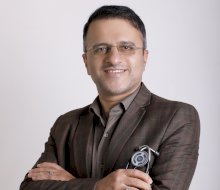
In this interview we found out more about Prof. Mohammadkazem Bakhshandeh who specialises in paediatric neuromuscular disorders in Tehran, Iran.

Affiliation: Assistant Professor, Department of Pediatrics, Faculty of Medicine, Tehran Medical sciences, Islamic Azad University,Tehran, Iran.
Position: Pediatric Neurologist, Neuromuscular Fellowship.
What education and training did you have to arrive at your current position?
I have studied medicine in Iran University of Medical Sciences. After the course of pediatrics specialty I have won the second rank of pediatrics board exam in Iran. Then immediately I have studied pediatric neurology in Shahid Beheshti Medical University and directly I went to Tokyo, and I have studied myology in National Center of Neurology of Japan under supervision of Professor. Ikuya Nonaka and Professor. Ichizo Nishino.
What led you to follow a career in the field of Myology in particular?
Because we had few experts in this field in our country and we need much efforts to do in myology.
What is your current research/clinical interest in Myology?
Now I am working on research of genetic diagnosis on neuromuscular disorders and I am doing new treatment such as stem cell therapy for muscular dystrophy and spinal muscular atrophy patients.
Working as a Myologist what are you most passionate about?
Actually I love in myology and my most passionate is supporting myology patients.
Do you do clinical work or are you involved in patient care?
Many patients from different cities of Iran referred to me and I could take care of them for their diagnosis and treatment.
What are the regional challenges from your point of view in the field of Myology?
We have consanguineous marriage more than 40 percent in Iran and also many types of genetic myology diseases. The main regional challenge is expensive genetic test such as next generation sequencing to diagnose these disorders and for prenatal prevention. Also because of different reasons (political and economic sanctions) the new gene therapy medications for genetic myology diseases are not available in Iran.
How does your work help patients in your region? What excites you most about the future of Myology?
I am trying to establish a multidisciplinary myology center in Iran to help the patients for diagnosis and treatment.
How do you see networking as a way to empower Myologists?
Networking is so useful to share the experiences of myology scientist with each other from different regions.
What inspires you to continue working in this field?
The feeling of humanity and sympathy inspires me to continue this field.
What is one unique fact about you that many other people don’t know?
High energy to reach the goal
How can being part of the WMS community encourage you and help your work?
WMS is a great support for establishment a multidisciplinary myology center in Iran.
When it comes to rare disorders, networking and collaboration is key. In this section we will be highlighting the effort and experience of myologists who are pioneers in their countries. Through this section, the WMS would like to reach out to help and offer support for experts in countries where myology is a developing field.
This article is presented by the
Myology developments across the world Committee.
Published on 4 June 2021.